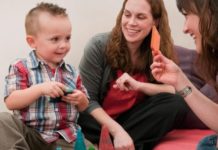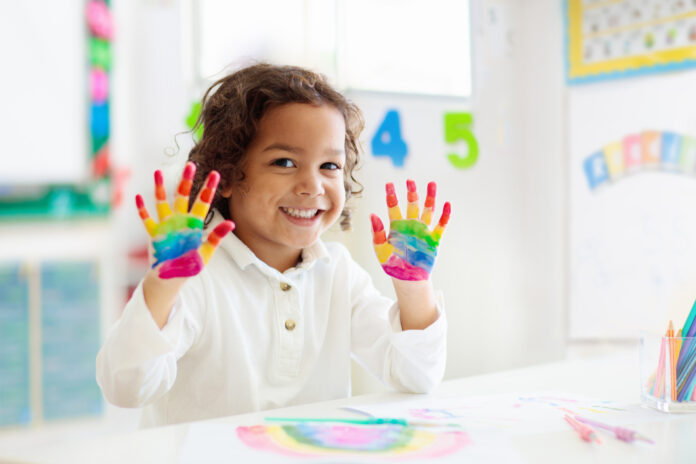
It takes a village to raise a child. Well, there’s a major truth in that age-old wisdom! Especially when it comes to nurturing wee ones on positive social skills early. An ideal stage? Preschool.
So, as parents, teachers, and caregivers – helping the littles foster healthy relationships is key! When peers connect peacefully on the playground, it can shape their confidence and empathy for life.
Here are some tips to guide you through the process.
Building A Supportive Environment
Imagine a preschool room where the air is buzzing with excitement and creativity. In one corner, you have a group of kids huddled around a set of building blocks. In another area, a pretend play space where little chefs are cooking up a storm in a play kitchen.
This is what setting the stage for cooperation looks like – creating inviting play spaces that naturally encourage children to come together and share activities. Now, think about how these little ones interact.
It’s not just about the toys they play with, but how they communicate. Imagine a child asking politely, “May I borrow the red crayon?” or another one inquiring, “Can we build a tower together?”
This is where educators and caregivers come in. They model the language of respect and problem-solving by guiding the young ones gently through the nuances of positive communication.
This approach doesn’t just build language skills; it lays the foundation for respectful and empathetic interactions. When children learn to appreciate the differences among them, it opens up a world of understanding and empathy.
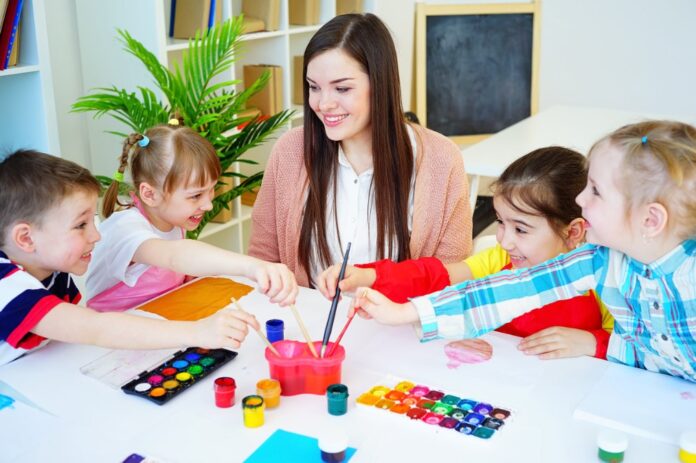
Promoting Social-Emotional Learning
Think about a circle time where children are sharing how they feel, using words to describe their emotions. They learn not just to recognize their own feelings, but also to see the signs of happiness, sadness, or frustration in their friends.
Role-playing social scenarios can be incredibly powerful here. It gives children a safe space to explore and understand different social situations and responses. The key is to equip your little ones with the tools to handle disagreements peacefully.
Another cornerstone of social-emotional learning is empathy and perspective-taking. Reading stories about friendship and cooperation is a great tool here. As educators delve into these stories, they pause to discuss the characters’ feelings and motivations.
It’s about getting the children to put themselves in someone else’s shoes and understand and feel what others might be going through.
Facilitating Positive Play Interactions
Picture a classroom where group projects, scavenger hunts, and cooperative games are the norms. These activities aren’t just fun; they’re designed to bring children together and working towards a common goal.
But it’s not just about setting up these activities and stepping back. It involves being an active facilitator asking questions such as “What can you create together with these blocks?” or suggesting, “Why don’t you ask your friend to join in your game?”
This approach helps children initiate and maintain positive interactions with their peers. The focus is always on reinforcing and praising the positive interactions. The result? An atmosphere where kindness and cooperation are the norm.
Wondering how your child can benefit from all this? Don’t let it give you sleepless nights. Experts such as those at Little Scribblers or other places near you can help give your child that experience. This is one great way to give your children the best experiences in their preschool years.
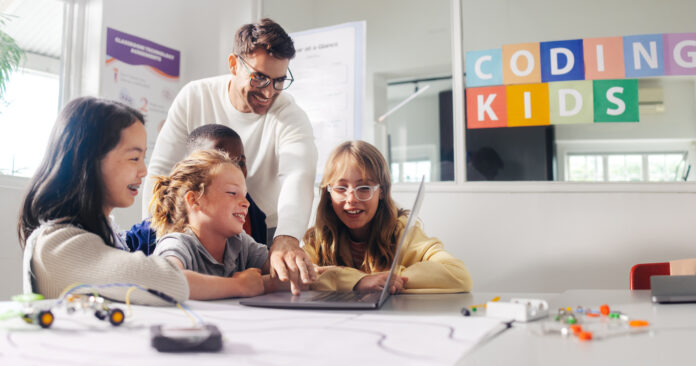
Individualized Support
Some children might struggle more than others when it comes to social skills or interacting with their peers. For these children, targeted interventions can make a world of difference.
One effective approach is setting up buddy systems. To get this right, connect children who are already adept at social interactions with those who might need a bit of guidance.
Another key aspect is involving families. It’s important to bridge the gap between school and home. By sharing strategies and observations with parents and caregivers, you’re ensuring a consistent approach.
This way, the positive peer interactions encouraged at school are also reinforced at home, creating a cohesive support system for the child.
Positive Reinforcement And Feedback
There’s this saying, “catch them being good.” It’s about recognizing and praising children when they exhibit positive behaviors like sharing, taking turns, or using kind words. A little acknowledgment can boost a child’s confidence and encourage them to keep up the good behavior.
Celebrating teamwork and collaboration, especially during group projects and activities, is another way to emphasize the value of working together. It’s not just about the end result, but about how they got there – cooperating, sharing ideas, and helping each other out.
Focusing on effort and progress is equally important. Every child develops at their own pace, so it’s vital to encourage them to keep trying. Celebrating their improvements, no matter how small, can motivate them to continue developing their social skills.
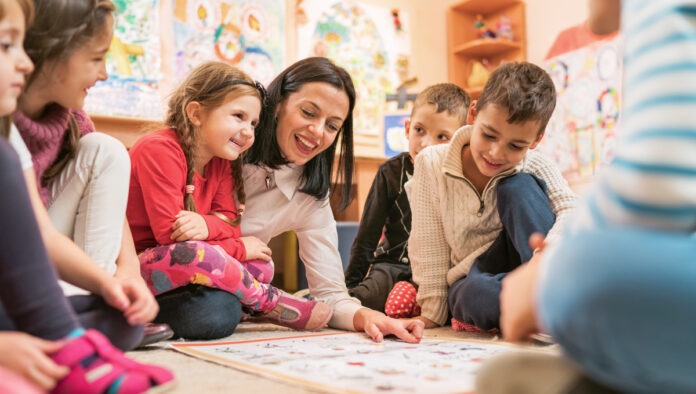
Playful Learning
Incorporating elements like movement and music can help to build teamwork, communication, and trust among children. Whether it’s singing, dancing, or other movement games, these activities can help children connect with each other in a joyful and relaxed environment.
Using puppets and props for role-playing can be incredibly effective too. It allows children to step into different roles and scenarios in a way that’s fun and non-threatening.
And then there’s interactive storytelling. Reading stories where children can participate actively, whether it’s by asking questions, making choices, or acting out roles, is not only engaging but also a subtle way to teach social skills.
Technology With A Purpose
In today’s digital age, it’s fantastic to have access to educational apps and games that are specifically designed for young children. These tools can be incredibly effective in teaching social-emotional learning, communication, and cooperation.
Think of it like giving kids a fun, interactive platform where they can learn how to work together and express themselves. It’s not just about screen time; it’s about what they do during that time.
And then there’s the idea of collaborative digital projects. Imagine children working together to create a presentation or a video. This not only nurtures their creativity but also teaches them the value of teamwork in a very modern context.
However, you need to monitor and make sure that these digital experiences complement real-life interactions rather than replace them.
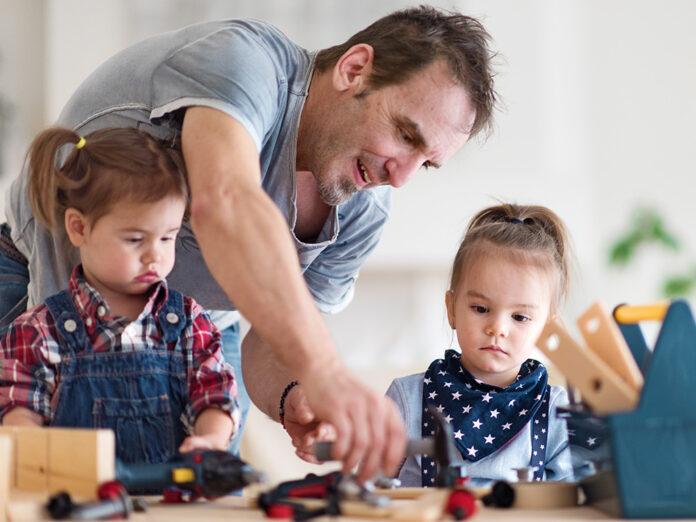
Celebrating Friendship And Community
Classroom events like class parties or talent shows are more than just fun activities. They’re opportunities for children to share and celebrate their friendships and accomplishments.
Encouraging acts of kindness is another beautiful aspect. When children learn to do kind things for each other, they’re not just building friendships; they’re becoming part of a caring community.
And it’s important to remember that building positive peer interactions is an ongoing journey. There will be milestones to celebrate and setbacks to learn from.
In Closing
Well, there you have it ─ all my favorite ways to pave the way for preschool success! Hopefully, you feel ready to nurture the next gen of cooperative, compassionate grown-ups. It truly takes a village!
Just remember ─ social skills start forming early. Guide gently, and redirect firmly if needed, but always reinforce the positive when you catch them caring and sharing! Soon enough, you’ll witness those friendships turn from sandbox playmates to lifelong bonds shaping who they’ll become.


